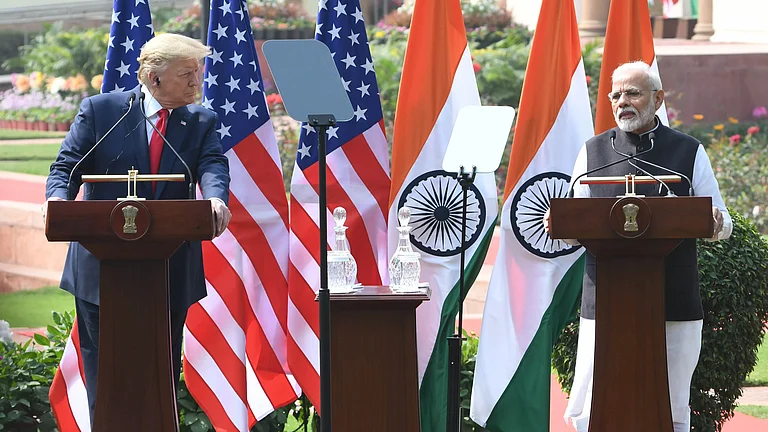Exporters rushed to clear existing orders last week ahead of the tariff hike.
Goods worth an estimated Rs 400–500 crore were shipped to the US last week from Tirupur.
Industrialists fear that without swift government support, production cuts could soon translate into widespread layoffs.
Tirupur Exporters Scale Back Production Ahead Of 50 Per Cent US Tariff
Tirupur’s knitwear hub accelerates shipments to the US but faces looming production cuts and job losses as exporters seek urgent government relief.
As the deadline for the 50 per cent US tariff nears, exporters’ hopes of a last-minute reprieve have been overtaken by realism. Exporters in Tirupur and Coimbatore, wary of losing their biggest market, have pushed out shipments in the past fortnight to meet existing orders before the hike comes into force. Yet, the industry is bracing for a slowdown. Production cuts have already begun, signalling the first signs of contraction in an export cluster that employs lakhs of workers.
Tirupur, the knitwear capital of India, is home to over 2,500 export units and more than 20,000 ancillary units. For them, the tariff shock is not merely about pricing—it threatens their competitive edge in a global market already under pressure from rising costs, shifting demand, and competition from Bangladesh and Vietnam. With margins thinning, exporters fear that the 50 per cent duty could accelerate order diversions to rival hubs, undermining Tirupur’s decades-old dominance in cotton knitwear.
Two weeks ago, exporter N.Thirukumaran was confident when Outlook met him at his factory. He believed the US would reconsider the 50 per cent tariff hike, arguing that such a steep duty would also hurt the US economy. But when Outlook spoke to him again on Tuesday, the mood had shifted: “exporters are bracing for reality,” he admitted.
In anticipation of the tariff wall, exporters rushed to clear shipments last week, pushing out goods worth an estimated Rs 400–500 crore to the US. According to the Exporters Association, Tirupur typically ships different kinds of textile items worth Rs 1,200–1,500 crore to the US every month, with knitwear dominating the basket. The accelerated dispatches reflect not optimism, but urgency. It is an effort to shield existing orders before the new duty takes effect.
“We have met Chief Minister M. K. Stalin to raise our concerns regarding the tariff hike last week,” says Thirukumaran. “What we need is short-term assistance from the government before we can explore other markets. Announcing a loan moratorium and easing credit availability are some of the immediate measures exporters expect. The CM has wrote to the Union government. We are all waiting for how the government is going to respond to save the industry”.
S. Elango, who manages an export unit, pointed out that some units have already started cutting back production. “Unless immediate measures are announced, the situation could worsen,” he warned.
Industry insiders argue that government intervention is critical to cushion the impact in the short term, as exporters cannot pivot overnight to new markets. Without relief in working capital and credit support, they fear a cascading effect of idle capacity, delayed payments to workers, and stress among the smaller ancillary units that form the backbone of Tirupur’s knitwear economy. This will lead to further cuts in production, resulting in layoffs.
“Free Trade Agreements with the European Union and some other countries are in the pipeline. In the long run, this could help offset the US impact. But that will take at least two years. During this period, the government must step in,” says Elango.
The urgency is clear. Nearly 45 per cent of Tirupur’s exports are bound for the US, and once the 50 per cent tariff takes effect, a significant number of units will struggle to remain competitive. “If the units have to cut down production, it will eventually affect the workers,” warns Thirukumaran.
Tirupur and Coimbatore export garments and other textile items worth more than Rs 45,000 crore annually. Out of India’s total textile exports worth 36.61 billion last year, 26.68 per cent were from Tamil Nadu.
Tirupur’s textile ecosystem employs more than 10 lakh people across spinning, knitting, dyeing, stitching, and packaging units. According to mill owners, nearly 65 per cent of these workers are women—many of them first-generation industrial employees from rural households who depend on steady wages for household expenses, the education of children, and healthcare. Any prolonged disruption in orders could result in widespread job losses, wage delays, and economic insecurity at the family level.
The impact will not stop at the factory gates. Tirupur’s economy is deeply interlinked with ancillary industries—transporters, dyeing units, printing houses, traders of yarn and accessories—most of which are run by small and medium enterprises.



